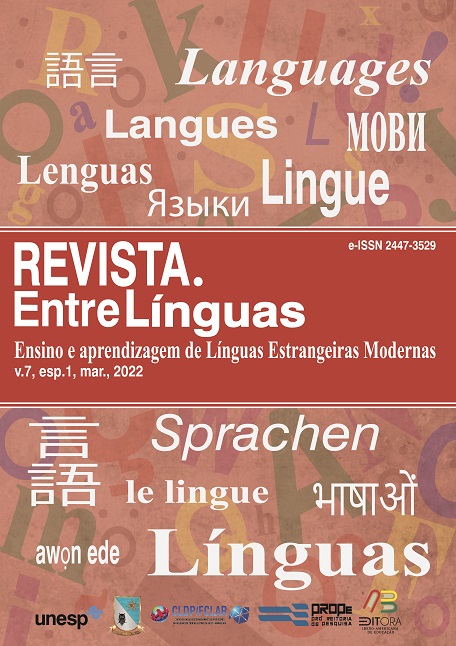Foreign language and music education status in a non-linguistic university system
DOI:
https://doi.org/10.29051/el.v8iesp.1.16917Keywords:
Foreign Language, Principal and Supplementary Subjects, Principal Voice, AccompanimentAbstract
This paper is aimed at providing theoretical grounding of “Foreign language” status as an academic discipline in the range of other subjects studied at a non-linguistic university. Research shows that high requirements are set to supplementary subjects, such as accompaniment and foreign language which have their individual status as well as semantic and dynamic characteristic features. Beneficial interaction of the soloist and accompanist plays a mutually enriching role giving an insight into the piece of music both for the musician and the audience. The humanitarian component introduced into the educational process through language studies complements and enriches the whole process and provides it with semantic fullness. Analysis of the dialectical parallels (principal subject – supplementary subject, principal voice – accompaniment) proved that each of their components has its own status.
Downloads
References
ABRUDAN, C. S.; STURZA, A.; SUPURAN, A. Raising Engineering Students’ Awareness as Regards the Importance of Improving their Proficiency in English. Journal of Teaching English for Specific and Academic Purposes, v. 9, n. 1, p. 99-108, 2021. Available in: http://espeap.junis.ni.ac.rs/index.php/espeap/article/view/1095. Access in: 05 Oct. 2020.
BAZHANOV, N. S. Agogic and tempo in sounding of the musical piece. Bulletin of Tomsk State University Journal of Cultural Studies and Art History, v. 36, p. 130–139, 2019. Available in: https://cyberleninka.ru/article/n/agogika-i-temp-v-zvuchanii-muzykalnogo-proizvedeniya. Access in: 12 Mar. 2021.
GANYUSHKINA, E. V.; MUKHINA, T. G. Literature as a means of professional and ethical culture development with medical students. In: PROCEEDINGS OF INTERNATIONAL APPLIED RESEARCH CONFERENCE, 4., 2021, Nizhny Novgorod. Annals[…]. Lobachevsky State University of Nizhny Novgorod, Nizhny Novgorod, Russia, 2021.
GLINKA, M. I. Literary Heritage. Leningrad, 1952.
HANNA, M.; FINS, J. J. Power and communication: Why simulation training ought to be complemented by experiential and humanist learning. Acad. Med., v. 81, n. 3, p. 265–270, 2006. Available in: https://pubmed.ncbi.nlm.nih.gov/16501273/. Access in: 12 Feb. 2021.
HARMER, J. The Practice of English Language Teaching. London: Longman, 1991.
IVANOV, S. S. Forming listening and verbal and motor functions of the speaker in a foreign language environment. In: PROCEEDINGS OF INTERNATIONAL APPLIED RESEARCH CONFERENCE, 2018, Nizhny Novgorod. Annals […]. Lobachevsky State University of, Nizhny Novgorod, 2018.
KANNO, Y.; STUART, C. Learning to Become a Second Language Teacher: Identities-in-Practice. The Modern Language Journal, v. 95, n. 2, p. 236-252, 2011. Available in: https://onlinelibrary.wiley.com/doi/10.1111/j.1540-4781.2011.01178.x. Access in: 12 Apr. 2021.
KHUSNULINA, R. R.; ISLAMOVA, G. G. Enriching role of a foreign language in a non-linguistic university. Teaching And Research Activities, p. 276-281, 2011. Available in: https://m.cyberleninka.ru/article/n/razvivayuschaya-rol-inostrannogo-yazyka-v-neyazykovom-vuze. Access in: 04 Mar. 2021.
KRYLOV, I. A. Quartet. St. Petersburg, 1811.
KUZNETSOVA, T. G. Foreign language role in preparing future specialists in a non-linguistic university. Saratov: Saratov National Research State University. Available in: https://www.sgu.ru/sites/default/files/textdocsfiles/2014/03/13/kuznecova_t.g.pdf. Access in: 10 Mar. 2021.
LONGMAN DICTIONARY OF CONTEMPORARY ENGLISH. London: Pearson Education limited. 2001.
LUBLINSKIY, A. A. Theory and practice of accompaniment. Leningrad: Muzyka, 1972.
MAZUR, A. E. The Art of Appreciating Accompaniment. Musical U, EUA. Available in: https://www.musical-u.com/learn/the-art-of-appreciating-accompaniment/. Access in: 12 June 2021.
PENNINGTON, M. C. Teacher Identity in TESOL: A Frames Perspective. In: CHEUNG, Y. L.; SAID, S. B.; PARK, K. (eds.). Advances and Current Trends in Language Teacher Identity Research. Abingdon: Routledge, 2015.
RAJGURU, S. P. Establishing English for specific purposes position in ELT Context. Journal of Teaching English for Specific and Academic Purposes, v. 5, n. 3, p. 515-519, 2017. https://doi.org/10.22190/JTESAP1703515R
REBENKO, M. Modelling ESP Teacher Identity in Ukranian Tertiary Education. Journal of Teaching English for Specific and Academic Purposes, v. 8, n. 3, p. 201-213, 2020. Available in: http://espeap.junis.ni.ac.rs/index.php/espeap/article/view/1061. Access in: 20 Mar. 2021.
RIMAN, G. Musical Dictionary. Moscow: Yurgenson, 1901.
SUPRUNOV, S. E. Studying foreign languages in a non-linguistic university. Samara: Vector, 2017.
SVIDERSKY, V. I. Structures and Elements Dialectics. Moscow, 1962.
TAO, J. T., GAO, X. A. Identity Constructions of ESP Teachers in a Chinese University. English for Specific Purposes, v. 49, p. 1-13, 2018. Available in: https://www.sciencedirect.com/science/article/abs/pii/S0889490617302685. Access in: 2 June 2021.
TER-MINASOVA, S. G. Language and intercultural competence. Мoscow: Slovo, 2000.
VETLUZHSKAYA, M. V. et al. Characteristics of Emotional Intelligence and Empathic Abilities in Medical Students. Integration of Education, v. 23, n. 3, p. 404-422, 2019. Available in: https://www.researchgate.net/publication/336142771_Characteristics_of_Emotional_Intelligence_and_Empathic_Abilities_in_Medical_Students. Access in: 14 Apr. 2021.
VOVSI-TILL'E, L. A. Modern goals of teaching foreign languages in a non-linguistic university. Pedagogical Journal, v. 8, n. 3A, p. 132-137, 2018. Available in: http://publishing-vak.ru/file/archive-pedagogy-2018-3/18-vovsi-tille.pdf. Access in: 13 June 2021.
WU, H.; BADGER, R. G. In a Strange and Uncharted Land: ESP teachers’ strategies for dealing with unpredicted problems in subject knowledge during class. English for Specific Purposes, v. 28, n. 1, p. 19-32, 2009. Available in: https://www.sciencedirect.com/science/article/abs/pii/S0889490608000483. Access in: 15 June 2021.
YAZAN, B.; LINDAHL, K. Language Teacher Identity in TESOL: Teacher Education and Practice as Identity Work. New York: Routledge, 2020.
Published
How to Cite
Issue
Section
License

This work is licensed under a Creative Commons Attribution-NonCommercial-ShareAlike 4.0 International License.
Os manuscritos aceitos e publicados são de propriedade da Revista EntreLínguas. Os artigos publicados e as referências citadas na Revista EntreLínguas são de inteira responsabilidade de seus autores.
Transferência de direitos autorais – autorização para publicação
Caso o artigo submetido seja aprovado para publicação, já fica acordado que o(s) autor(es) autoriza(m) a UNESP a reproduzi-lo e publicá-lo na EntreLínguas, entendendo-se os termos “reprodução” e “publicação” conforme definição respectivamente dos incisos VI e I do artigo 5° da Lei 9610/98. O artigo poderá ser acessado pela rede mundial de computadores (Internet), sendo permitidas, a título gratuito, a consulta e a reprodução de exemplar do artigo para uso próprio de quem a consulta, desde que haja a citação ao texto consultado. Essa autorização de publicação 328 EntreLínguas, Araraquara, v. 1, n .2, p. 323-328, jul./dez. 2015 não tem limitação de tempo, ficando a UNESP responsável pela manutenção da identificação do(s) autor(es) do artigo. Os artigos publicados e as referências citadas na Revista EntreLínguas são de inteira responsabilidade de seus autores.











